网络流行语传播研究外文文献翻译最新 网络热词
英文毕业论文-网络流行语及其英文翻译
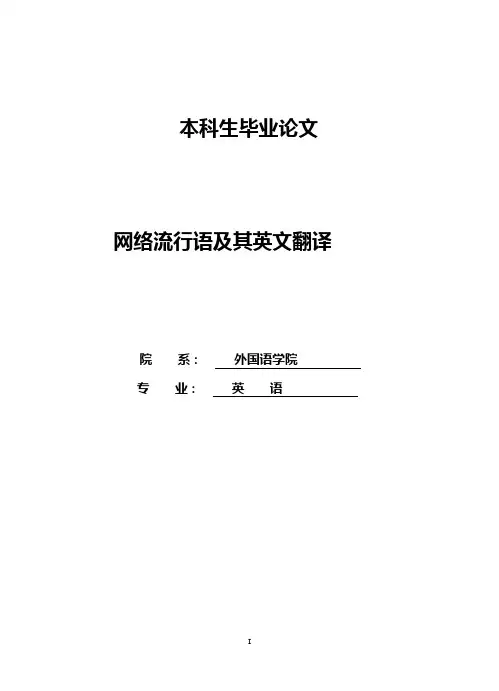
本科生毕业论文网络流行语及其英文翻译院系:外国语学院专业:英语A Study of EnglishTranslation of Network Catchwords摘要随着中国国际化进程日益加快和互联网的普及,越来越多的外国友人更加密切地关注中国。
与此同时,中国网民也创造了不少幽默诙谐、充满智慧的语言,一些鲜活的流行语不仅在网络上迅速传播,还渗透到社会生活中。
然而通过对汉语网络流行语翻译的研究现状来看,汉语网络流行语的翻译工作还有待进一步的发展。
本文首先介绍了流行语和网络流行语的背景以及它们之间的从属关系。
其次,网络流行语主要来源于网络用语、影视用语和外来语。
通过对其来源的分析,进一步概括出网络流行语之所以流行的原因。
从广义上来说,网络流行语的形成不仅是语言继承性和创新性的有机结合,它的简洁、幽默、流行性和周期性也让众多网民对其更加追捧和使用。
然而,在网络流行语不断追求个性、不断创新的洪流中,也不可避免地出现了粗俗化现象。
本文根据奈达的功能对等理论,对汉语网络流行语的翻译技巧进行了分析和总结之后发现,在网络流行语的翻译中直译、直译夹注、意译、意译加注、加缀法和改译法仍是十分有效和常用的技巧。
关键词:网络流行语;来源;特征;翻译AbstractWith the accelerating process of China Internationalization and popularity of the Internet, more and more foreigners pay closer attention to China. At the same time, Chinese netizens also create many humorous and witty words some of which spread like wildfire through Internet and also deeply enter the social life. However, through the translation situations of Chinese network catchwords, the translation problem needs further development. The thesis firstly introduces the background of catchword, network catchwords and their subordinate relationship. Secondly, network catchwords mainly originate from network expression, expression in entertainment industry and foreign words. By analyzing its sources, the causes of popularity of network catchwords have been displayed clear for us. Broadly speaking, network catchwords are not only combination of linguistic inheritance and innovation, but also adored and used by netizens because of its concision, humor, popularity and periodicity. However, continuous pursuit for uniqueness and innovation also emerge vulgar usage of it. After analyzing and concluding the translation skills of Chinese network catchwords according to Nida’s Functional Equivalence theory, it is found that the translation methods including literal translation, literal translation with interlinear notes, free translation, free translation with interlinear notes, affixation method andadapted translation are still effective and common ones.Key Words: Network Catchwords; Sources; Features; TranslationTable of Contents Acknowledgements.......................................................................................... 错误!未定义书签。
热词2023双语解释
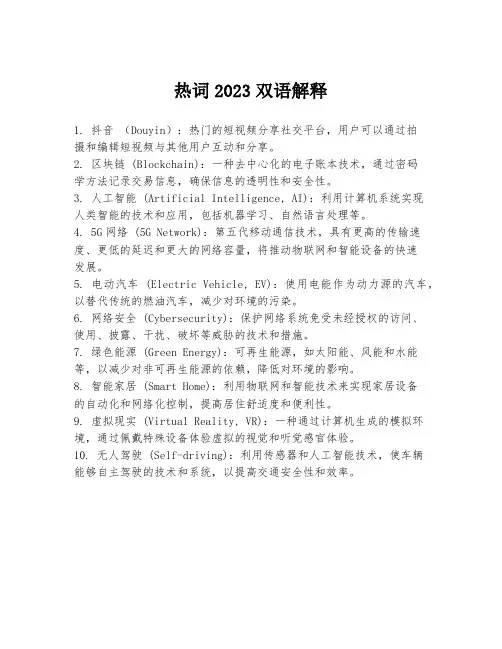
热词2023双语解释
1. 抖音(Douyin):热门的短视频分享社交平台,用户可以通过拍
摄和编辑短视频与其他用户互动和分享。
2. 区块链 (Blockchain):一种去中心化的电子账本技术,通过密码
学方法记录交易信息,确保信息的透明性和安全性。
3. 人工智能 (Artificial Intelligence, AI):利用计算机系统实现
人类智能的技术和应用,包括机器学习、自然语言处理等。
4. 5G网络 (5G Network):第五代移动通信技术,具有更高的传输速度、更低的延迟和更大的网络容量,将推动物联网和智能设备的快速
发展。
5. 电动汽车 (Electric Vehicle, EV):使用电能作为动力源的汽车,以替代传统的燃油汽车,减少对环境的污染。
6. 网络安全 (Cybersecurity):保护网络系统免受未经授权的访问、
使用、披露、干扰、破坏等威胁的技术和措施。
7. 绿色能源 (Green Energy):可再生能源,如太阳能、风能和水能等,以减少对非可再生能源的依赖,降低对环境的影响。
8. 智能家居 (Smart Home):利用物联网和智能技术来实现家居设备
的自动化和网络化控制,提高居住舒适度和便利性。
9. 虚拟现实 (Virtual Reality, VR):一种通过计算机生成的模拟环境,通过佩戴特殊设备体验虚拟的视觉和听觉感官体验。
10. 无人驾驶 (Self-driving):利用传感器和人工智能技术,使车辆
能够自主驾驶的技术和系统,以提高交通安全性和效率。
网络流行语的翻译标准版资料

伤不起
Can not afford to be hurt
This sentence is so popular that in a very short time , it spreads to every corner especially on the
我爸是李刚
My father is Li Gang
• Described capital,swollen with arrogance, fear nothing
形容有资本、气焰嚣张、有恃无恐 • Source: A night in HeBei
University in central China, a car accident happened. One girl was injured and one was died. The driver, a 22-year-old boy, who was intoxicated(醉酒的), tried to speed away, when the security guards intercepted(拦 截) him ,he warned them: ‘My father is Li Gang!’
What I am smoking isn’t a cigarette,
but loneliness哥抽的不是香烟,是寂寞
This sentence is usually used to describe that I have dTohneissomseethnintge,ynocu eareudsrouppaedllbyehuinsdebydmteo,dodne’st tcryrtiobceatcah uap twtiithtumde,e
网络新词的流行英语作文
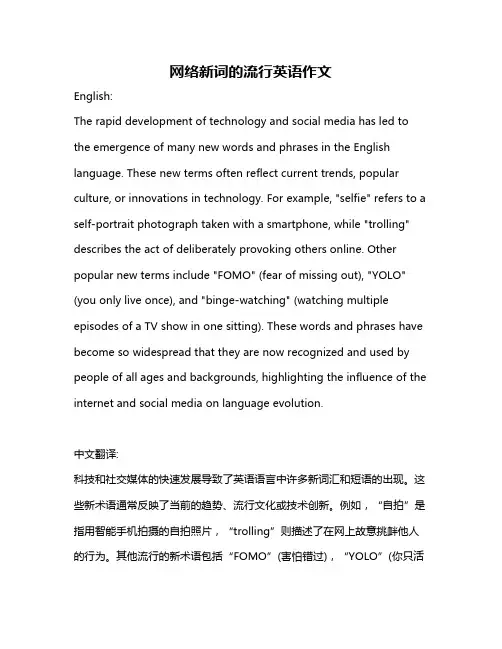
网络新词的流行英语作文English:The rapid development of technology and social media has led to the emergence of many new words and phrases in the English language. These new terms often reflect current trends, popular culture, or innovations in technology. For example, "selfie" refers to a self-portrait photograph taken with a smartphone, while "trolling" describes the act of deliberately provoking others online. Other popular new terms include "FOMO" (fear of missing out), "YOLO" (you only live once), and "binge-watching" (watching multiple episodes of a TV show in one sitting). These words and phrases have become so widespread that they are now recognized and used by people of all ages and backgrounds, highlighting the influence of the internet and social media on language evolution.中文翻译:科技和社交媒体的快速发展导致了英语语言中许多新词汇和短语的出现。
2023十大流行语 汉英双语
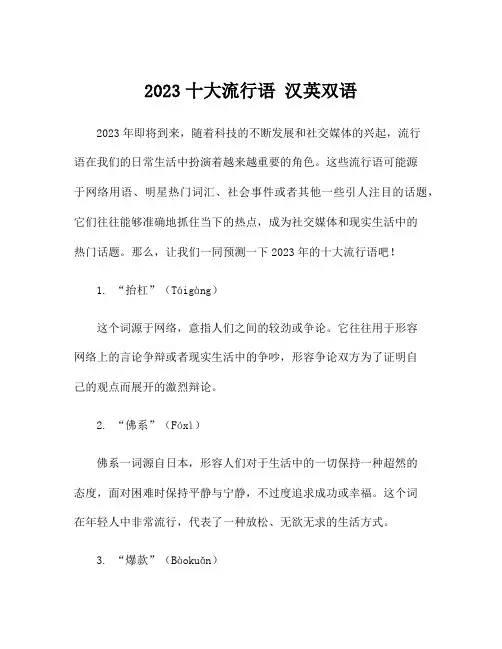
2023十大流行语汉英双语2023年即将到来,随着科技的不断发展和社交媒体的兴起,流行语在我们的日常生活中扮演着越来越重要的角色。
这些流行语可能源于网络用语、明星热门词汇、社会事件或者其他一些引人注目的话题,它们往往能够准确地抓住当下的热点,成为社交媒体和现实生活中的热门话题。
那么,让我们一同预测一下2023年的十大流行语吧!1. “抬杠”(Táigàng)这个词源于网络,意指人们之间的较劲或争论。
它往往用于形容网络上的言论争辩或者现实生活中的争吵,形容争论双方为了证明自己的观点而展开的激烈辩论。
2. “佛系”(Fóxì)佛系一词源自日本,形容人们对于生活中的一切保持一种超然的态度,面对困难时保持平静与宁静,不过度追求成功或幸福。
这个词在年轻人中非常流行,代表了一种放松、无欲无求的生活方式。
3. “爆款”(Bàokuǎn)这个词意指在市场上轰动一时、非常走红的产品或服务。
它可能是由某个商业巨头推出的产品,也可能是一部电影、一本书或者一种流行的音乐。
随着商业竞争的加剧,爆款已经成为社交媒体上人们争相关注和追逐的对象。
4. “零食控”(Língshí kòng)这个流行语用于形容热爱吃零食的人。
随着生活水平的提高,人们对于食品的品质和口味要求也越来越高。
零食控成为了代表人们追求美食的标志词汇。
5. “追星族”(Zhuī xīng zú)追星族这个词用于形容热衷追逐和崇拜明星的人们。
随着娱乐产业的蓬勃发展,明星在人们的生活中扮演着越来越重要的角色。
追星族成为了描述那些对明星有着极高热情的人的代名词。
6. “网红”(Wǎnghóng)网红一词已经成为了社交媒体时代的代表,指的是通过社交媒体走红的人物。
网红可以是通过发布视频、写博客或者在社交平台上展示自己的才艺而获得大量关注的人。
网红们通过自己的个人魅力和独特的特点成为了年轻人崇拜的对象。
当代网络热词英语作文
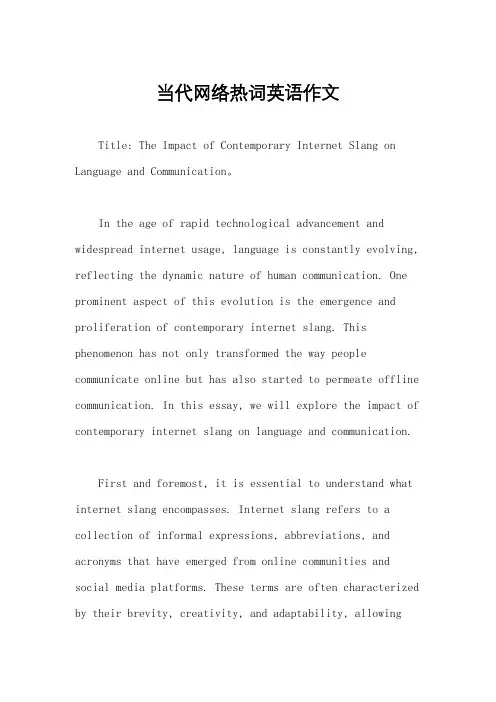
当代网络热词英语作文Title: The Impact of Contemporary Internet Slang on Language and Communication。
In the age of rapid technological advancement and widespread internet usage, language is constantly evolving, reflecting the dynamic nature of human communication. One prominent aspect of this evolution is the emergence and proliferation of contemporary internet slang. This phenomenon has not only transformed the way people communicate online but has also started to permeate offline communication. In this essay, we will explore the impact of contemporary internet slang on language and communication.First and foremost, it is essential to understand what internet slang encompasses. Internet slang refers to a collection of informal expressions, abbreviations, and acronyms that have emerged from online communities and social media platforms. These terms are often characterized by their brevity, creativity, and adaptability, allowingusers to convey complex ideas and emotions succinctly. Examples include "LOL" (laugh out loud), "BRB" (be right back), and "OMG" (oh my god).One of the most significant impacts of contemporary internet slang is its influence on linguistic norms and conventions. As internet slang becomes increasingly integrated into everyday communication, especially among younger generations, traditional rules of grammar and spelling are being challenged. For instance, the use of abbreviations and non-standard punctuation in formalwriting contexts, such as emails and academic papers, has become more prevalent. While some argue that this blurring of linguistic boundaries undermines the integrity of the language, others view it as a natural evolution reflective of changing communication patterns.Furthermore, internet slang has reshaped the way people express themselves and connect with others online. In the digital age, where brevity is often valued over verbosity, internet slang allows individuals to convey messagesquickly and efficiently. Emoticons and emojis, which areoften used in conjunction with slang terms, provide additional layers of meaning and emotional nuance, enhancing the overall communicative experience. As a result, online interactions have become more dynamic and expressive, fostering a sense of community and belonging among users.However, it is important to recognize that internet slang is not without its drawbacks. One potential concernis the potential for miscommunication and misunderstanding, particularly across cultural and generational divides.While internet slang may be familiar to digital natives, older generations and non-native speakers may struggle to interpret its meaning correctly, leading to confusion or unintended offense. Moreover, the rapid evolution ofinternet slang means that terms can quickly become outdated or obsolete, further complicating communication dynamics.Despite these challenges, it is clear that contemporary internet slang has become an integral part of modern communication. Its widespread use across various online platforms and social media networks underscores its significance as a cultural phenomenon. As languagecontinues to evolve in response to technological innovation and social change, internet slang will likely remain a central feature of digital discourse, shaping the way we communicate and interact in the digital age.In conclusion, the impact of contemporary internet slang on language and communication is profound and far-reaching. From influencing linguistic norms to reshaping online interactions, internet slang has fundamentally transformed the way we communicate in the digital age. While it presents challenges in terms of clarity and comprehension, its expressive power and cultural significance cannot be denied. As we continue to navigate the ever-changing landscape of digital communication, understanding and embracing internet slang will beessential for effective and meaningful engagement online.。
网络热词及流行语英文翻译解析
移 学 术 探 讨 镣
网络 热 词及 流行 语 英 文翻 译 解 析
曹 晓君 ( 西安 交通 工程 学院
摘要 : 该论文主要研究 网络热词及流行语 英文翻译方法. 通过搜集整理网络热词和流行 语进而对构词方法进行 比较 、 分析、 总结 . 得出 网络热词及流行语英文翻译方法主要有 : 完全 汉语拼音式翻译法 、来源于发音的翻译法 、 汉 语拼音和英文混搭合成法、运用英语构词法、 中式英语翻译法、 直译和意译等 . . 关键词: 网络热词 流行语 英文 翻译
1 . 坑爹 t h e r e v e se r o f o n e ’ S e x p e c t a t i o n .
有 某人很厉害 、 很 有 能力的意 思 。) 、傻逼 s h a b i l i t v ( 意思 是 “ 傻 瓜” 或“ 总是 把一切 搞得 团糟的人” ) 【 例句 l Ma n y p e o p l e t h i n k t h e y a r e f u l l o f
Ab 吼r a c l :T h i s p a p e r s t r o n g l y e mp h a s i z e s n e t w o r k h o t w o r d s a n d b u z z w o r d s t r a n s l a t i o n a n a l y s i s .F i r s t l y ,c o l l e c t i n g n e t w o r k h o t w o r d s a n d b u z z w o r d s ; s e c o n d l y ,b y c o mp a r i n g ,a na — l y z i n g a n d s u mma r i z i n g t h e m,i t c o n c l u d e s t h e t r a n s l a t i o n m e t h o d s o n n e t w o r k h o t w o r d s a n d b u z z w o r d s ma i n l y h a v e B o p o m o f o m e t h o d ; t r a n s . 1 a t i o n b y l o e l a d i a l e e t p r o n u n c i a t i o n ; B o p o m o o f c o mb i n e d E n g l i s h ;w o r d f o r m a t i o n ;C h i n g l i s h ; me t a p h r a s e a n d p a r a p h r a s e .
网络流行语英文版大盘点
网络流行语英文版大盘点1. Rich and Bitch有钱就是任性Have you noticed that so many people claimed themselves "rich and bitch" in friends circle and Sina weibo? What a "malicious" world! The buzzword originates from a real event: In April, Mr. Liu spent 1760 yuan online buying a health care product. Soon after, he got calls from a stranger who persuaded him to buy other matched medicines. In the following four months, Mr. Liu remitted a total of 540,000 yuan to the swindler. He said that he had already found himself cheated when he was fooled out of 70,000 yuan. "I just wanted to see how much could they take from me!"最近有没有发现,朋友圈和微博上到处都有人说自己“有钱,任性”,感觉到世界森森的恶意呀。
这个流行语来源于一个真实事件:今年4月份,老刘在网上花了1760元买了一款保健品。
不久之后,他接到一个陌生号码的电话说,必须再买其他配药才会有疗效。
接下来四个月,老刘一共给骗子汇去54万元。
老刘说,在他被骗了7万元的时候,已经发现自己被骗了。
“我就是想看看,他们究竟能骗我多少钱!”2. Are you kidding me?也是醉了!The father of the buzzword can be traced back to Linghu Chong, a character in Jin Yong's "Swordsman". He satirizes others' flattering by saying "The moment I see those who flatter me would I feel so uncomfortable as if I were drunk." Then a group of DOTA players often use this phrase. No matter one's skill is good or bad, they will say "Are you kidding me?"这一神回复的创始人,可以追朔到金庸《笑傲江湖》里的令狐大侠。
目前最全的网络流行语英文版
目前最全的网络流行语英文版网络流行词带你飞“坑爹”、“伤不起”、“吐槽”均是时下年轻人经常挂在嘴边的新鲜词。
这些词无论生命力多强,都给我们的语汇带来一丝喜感,给我们的生活带来一份轻松。
看看这些词汇你又了解多少呢?1. 神马都是浮云It’s all fleeting cloud。
2. 山寨 fake, counterfeit, copycat3. 宅男Otaku (“homebody” in English); geek4. 被雷倒(到)了 in shock5. 纠结 ambivalent6. 忐忑 anxious7. 悲催 a tear-inducing misery8. 坑爹the reverse of one’s expectation9. 哥只是传说 Brother is only a legend10.伤不起 vulnerable; be prone to getting hurt11.你懂的 It goes without saying that…12.吐槽disclose one’s secret13.小清新 like a breath of fresh air14.穿越剧 time-travel TV drama15.至于你信不信,反正我是信了。
Whether you believe it ornot, I am convinced。
16.拼爹 daddy-is-the-key; parents privilege competition17.做人呢,最重要是开心。
Happiness is the way。
18.卖萌 act cute19.腹黑 scheming20.折翼的天使 an angel with broken wings。
翻译方法:研究英语网络热词和流行语的翻译方法
研究英语网络热词和流行语的翻译方法一、引言。
“坑爹”“伤不起”“吐槽”等都是时下年轻人经常挂在嘴边的网络热词或流行语。
这些词汇丰富了我们的语言,赋予了一层更加幽默的内涵。
有些流行语已被录入美国在线俚语词典Urban Dictionary (城市词典)或《牛津英语字典》。
早期的 Chinglish(中式英语),多是一些自造英语单词,或者将中文逐个译成英语后的汉语式拼接,像“好久不见”(long time no see)、“人山人海”(people mountain people sea)等。
但如今,中式英语进化,拼音混搭英文,更多的中文拼音开始直接“侵入” 英语中,就像“zuo”(作)、“tuhao”(土豪)等。
二、网络热词和流行语英文翻译方法及解析。
(一)完全汉语拼音式翻译 :guanxi (关系)、Maotai (茅台)、Xiang (湘)、Dama(中国大妈)、Lianghui (两会)、Guanggun (光棍)、tuhao(土豪)、hukou(户口)等。
(二)来源于发音的翻译。
例如,dim sum(点心)。
该词汇来源于“点心”的粤语发音。
意为“通过蒸、炸等方式制作的餐点,含有丰富的馅料”.(三)汉语拼音和英文混搭合成词。
有些网络热词或流行语使用中文和英语混杂的方法。
例如:1.给力 gelivable(反义词 :不给力 ungeliv-able),形容词。
含义是“令人激动的,使人兴高采烈的”. 该词是汉语拼音“gei li”和英语后缀-able 的组合。
【例句】哇,中国超越日本成为世界第二大经济体,真给力!Wow,China overtakes Japan as world'ssecond-biggest economy, it is so gelivable!2. taikonaut 中国宇航员,前半部分是中文“太空”拼音 ,后半部分截取英语“astronaut”组合而成。
3. 装逼 zhuangbility(意思是“无缘无故地自夸”)、牛逼niubility?(在汉语中,牛“niu”含有某人很厉害、很有能力的意思。
- 1、下载文档前请自行甄别文档内容的完整性,平台不提供额外的编辑、内容补充、找答案等附加服务。
- 2、"仅部分预览"的文档,不可在线预览部分如存在完整性等问题,可反馈申请退款(可完整预览的文档不适用该条件!)。
- 3、如文档侵犯您的权益,请联系客服反馈,我们会尽快为您处理(人工客服工作时间:9:00-18:30)。
毕设附件:外文文献翻译原文+译文原文The research of network buzzwords spreadingMarkus DAbstractNetwork buzzwords from the Internet language, that is, first appeared in the Internet and popular on the Internet, created by users or reference and are endowed with special meaning of words and sentences. Here's the special meaning has two meanings: the first layer means that it is unique in a certain period of time on the network popular virtual things and behavior as well as the things associated with the computer network technology. The second means that it is very different from daily in the natural language system, the unique meaning, this means that a certain period of social politics, economy, culture and Internet psychological activity factors such as comprehensive product.Keywords: Network hot words; Buzzwords; Spreading1 IntroductionIn the 1980 s, Toffler in the United States believe that human civilization forward like waves, already had two causes the whole civilization and the great wave of social change: agriculture is the first wave of agricultural society is established. The second wave of industry established the industrial society. "Now is a new civilization in our life. The birth of the new civilization, is the only the most explosive events in our lives. The deep meaning of it, just like the invention of agriculture one hundred years ago the first wave of change of human liberation, or as the industrial revolution caused by the second wave of shock the world. We are the architects of the next change. Like it’s predicted, we ushered in the third wave, and the third wave is marked by information highway construction of the information revolution. In this case, the information highway is the emergence of the Internet. Its emergence caused a revolutionary change of the human social life each aspect. These changes occur, also affected the development of language change. Current research of network language has made certain achievements. In the definition of network language and theunderstanding of the nature has almost the same, and from the vocabulary, language symbols, language variation, and network communication, and other point of view to study and analysis of network language.2 The definition and characteristic of network buzzwords2.1 DefinitionsNetwork buzzwords, which first appeared in the Internet and popular on the Internet, created by users or lead Use and are endowed with special meaning of words and sentences. Here's the special meaning has two meanings: the first layer is mean. That it is unique in a certain period of time on the network popular virtual things and behavior, as well as electricity the brain network technology related things. The first means that it is on the second floor and daily in the natural language system completely different and unique meaning, this means that a certain period of social politics, economy, culture and Internet users factors such as comprehensive product.The first meaning refers to the prior to 2004, and could be called early network catchword. The second meaning refers to the popular time after 2004, classified collection by Internet users and ranked annually by site network buzzwords, but also can be called network buzzwords. Do such segmentation, is the cause of the early 2004 years ago the network buzzwords, the characteristics of the network language performance is more outstanding. And after 2004 network buzzwords, its popular features emerge slowly, began to tend to the daily language. Martin similar problems is analyzed, the similar conclusions. And mentioned in the introduction of network catchword is defined by Johan to summarize, the former definition of network buzzwords, notice is increasingly penetrating the natural language of network buzzwords, namely network catchword late. The definition of network buzzwords emphasizes its mediated and sociality, the network buzzwords in itself is no more. Compare the two definitions of network catchword are more systematic and comprehensive. At the same time, the definition of how to categorize the network catchword provides the help. Early network buzzwords, mainly form as a standard for classification of network catchword is late to source and popular time for standard to classify words.2.2 Features2.2.1 Times"Bright times is the most prominent feature of buzzwords, as a popular saying, also is a kind of" popular ", and other popular things, has its popular stage. And different period, the popular things are different, and used to reflect the popular catchphrase of the things is not the same. "Times namely phrase reflects certain social style and features of The Times, language style and public psychology. Network catchword epoch characterized by the following aspects: language is a social phenomenon, whenever changes in social life, it will be along with the social phenomena and the generation of new things and, as the die the death of the old things. V ocabulary is the most active elements in language, the changes of the external factors, often cause the evolution of vocabulary first.2.2.2 DynamicAnother feature of network catchword is its dynamic nature. In a sense, is closely related between the dynamic and time inseparable. Time itself is a dynamic concept. With the passage of time is never-ending running. Network buzzwords shows time determines the dynamic characteristics of it must advance with times. Summary from our previous annual network buzzwords can clearly be seen in this. Every year the network catchword has different change, basic won't appear the same situation. Some dead network buzzwords, for example the fact that more telling.2.2.3 CreativeCreativity is an important attribute of buzzwords, the network buzzwords creative performance is more outstanding, and language is the crystallization of human wisdom. Buzzwords is a kind of creative language, especially in the beginning of the can always give people the feeling that find everything new and fresh, which is one of important reasons why them popular. It is more serious and network catchword creativity. Network catchword creative main show is a form of had by it. In the former facing network buzzwords are classified, analyzed its form. At the same time, and analyze the source of creativity in the class. Among them, the harmonics class and controlled class embodies the Internet users to modify the old language form, conciseand interesting language expression of requirements. Pictographic class is completely ignoring the rules of grammar and classification, the pursuit of pure language innovation dissimilation. Net citizen’s creativity in the class is completely innovation of old language form. These words form embodies the catchword outstanding innovative network.2.2.4 DiversityNetwork popular language has its diversity and irregularity. Diversity is network catchword forms. there are many words in the selection of different users for a variety of vocabulary differences. Irregularity that is in the form of word formation is not specification and use of words. Network catchword is the reason is that language is an aggregation of diversity, and the user is a person. As for the individual user as a collection of symbols in the language selection of elements is diversity. Network catchword, as the most dynamic part of the modern Chinese, there are a variety of word forms, and the selection of different users for a variety of vocabulary differences, these differences is diversity. The cause of network buzzwords diversity is very complex: the use of network buzzwords, social groups and style often have to restrict and differences. Geographical, cultural degree, the different sex, age, use the catchword is different also, presents the diversification.3 The cause of network buzzwords3.1 Social reasonsLanguage as a social product is influenced by the social factors. American Fulbright scholars (w. Bright) was proposed in his "social linguistics" "language and social covariant: the theory of gradient and catastrophe occurs when the social life, as a social phenomenon of language will be unequivocally changing with the pace of progress in social life. Mr. Matins also said: "language is a variable, the society is another variable. The two variables influence each other, interact, mutual restrict, mutual change, this is covariant. If this means that we often say: when the gradient and catastrophe occurs in social life, language is bound to change with the pace of social life, so, this is completely understandable covariant theory. The theory of the above two scholars, respectively from the perspective of different illustrate a simpleprinciple: covariant relation between language and society. The covariant relationship is very complicated, because language itself is both complex and social system. Each generation and development of a social phenomenon and destruction will be left his mark on history; at the same time social phenomena of the fault is in contact with each other, mutual restriction conditions coexist. The pronunciation, vocabulary, grammar and so on the basic elements of a language in history, will leave traces of the development and change of, at the same time the language basic elements of fault is occurred in the form of aggregation or composition between contact and reflect the variation of language elements. Therefore, covariant relationship of language and society is sometime in the historical development as a whole and interweaved under fault conditions of complex network morphology.3.2 Economic factorsAffect the social factors, the network buzzwords economic factor is an important reason. According to the point of view of cognitive linguistics, cognition is the foundation of language. Language is the window of the cognitive. Economic activity has always been the main part of all human cognitive activity; it determines the survival and evolution of human language communication is almost accompanied by human economic activities. Famous British language scholar David Crystal emphasizes the relationship between language and economy, he believes that a language to become an international language mainly depends on speaking language of the people's economic strength, especially want to rely on military force way, establish the status of the international language. A kind of language to maintain its international language status, consolidate and expand its influence requires the economic strength. As one of the ideology of superstructure of network buzzwords, its emergence and development degree is decided by economic foundation. Current users of network buzzwords are mainly young Internet users, they is the creator and disseminator of network buzzwords. But must meet a number of prerequisites, can they creating, using, and spread on the Internet network buzzwords. These prerequisites include eating satisfied wear warm, having a fixed residence, with a computer and having access to the network, but also must have certain levels ofknowledge and have some leisure time every day.文献出处:Markus D. The research of network buzzwords spreading [J]. Control of Network Systems 2016, 3(1):21-30.译文网络流行语传播研究Markus D摘要网络流行语来自于网络语言,即最初出现于网络并在网络上流行,由网民创造或者引用并被赋予特殊含义的词语和句子。
